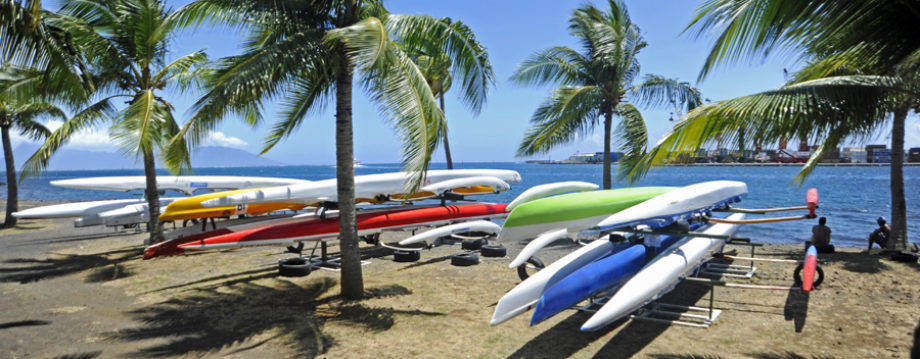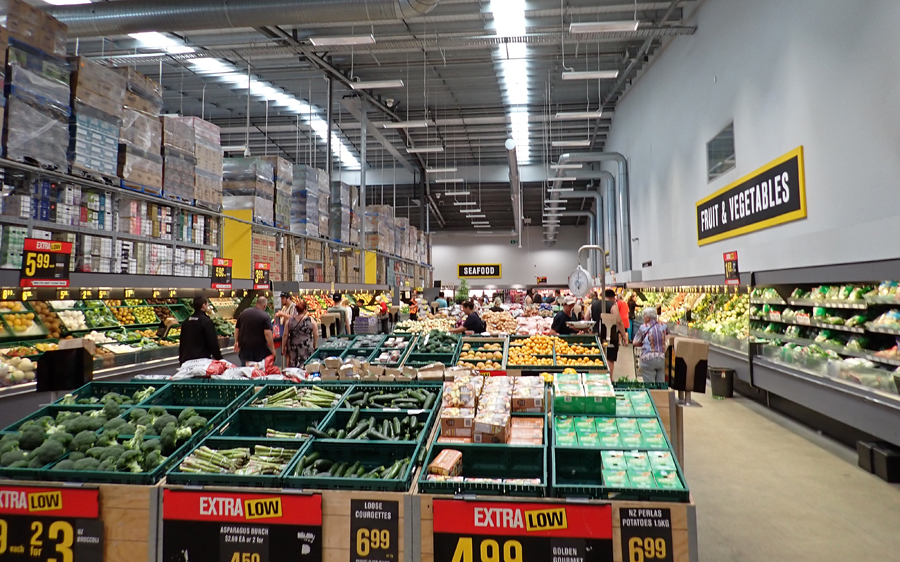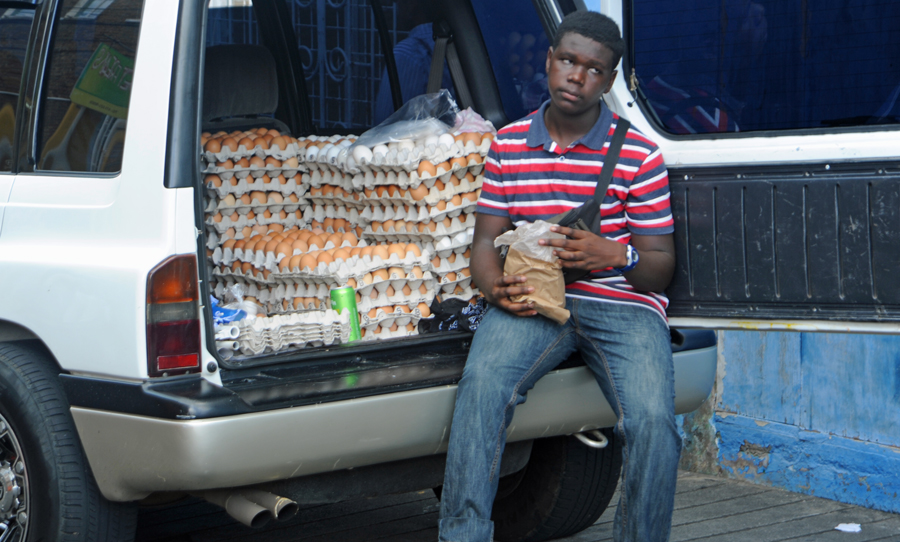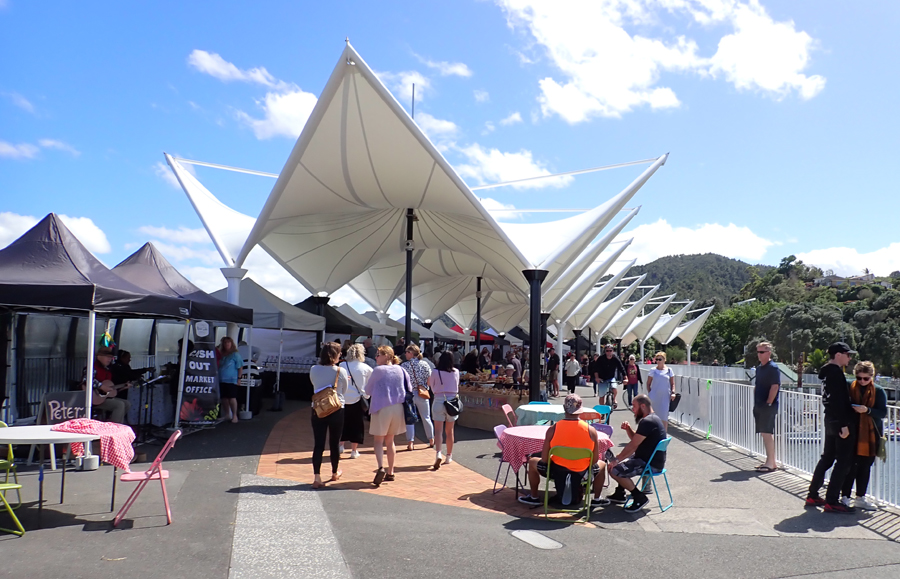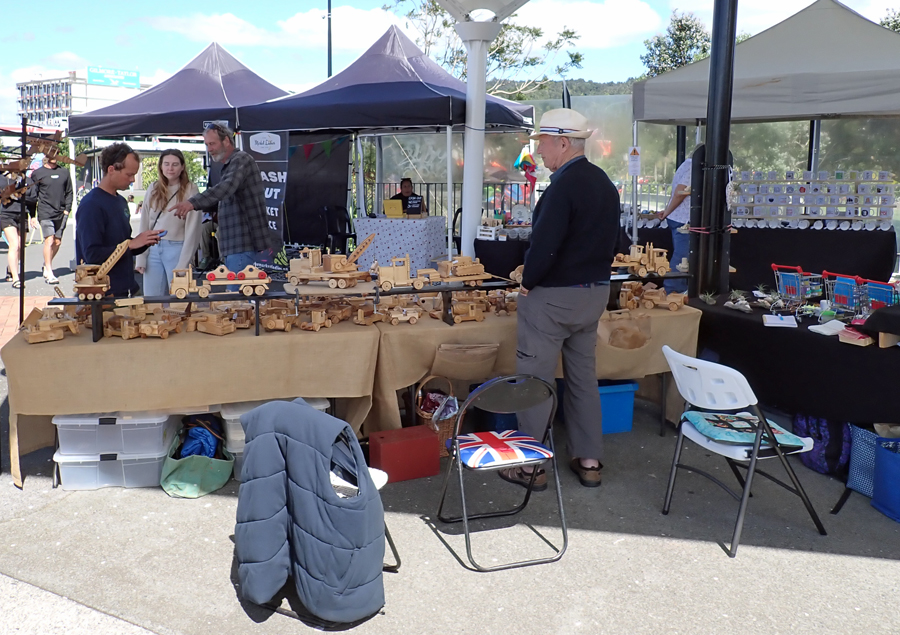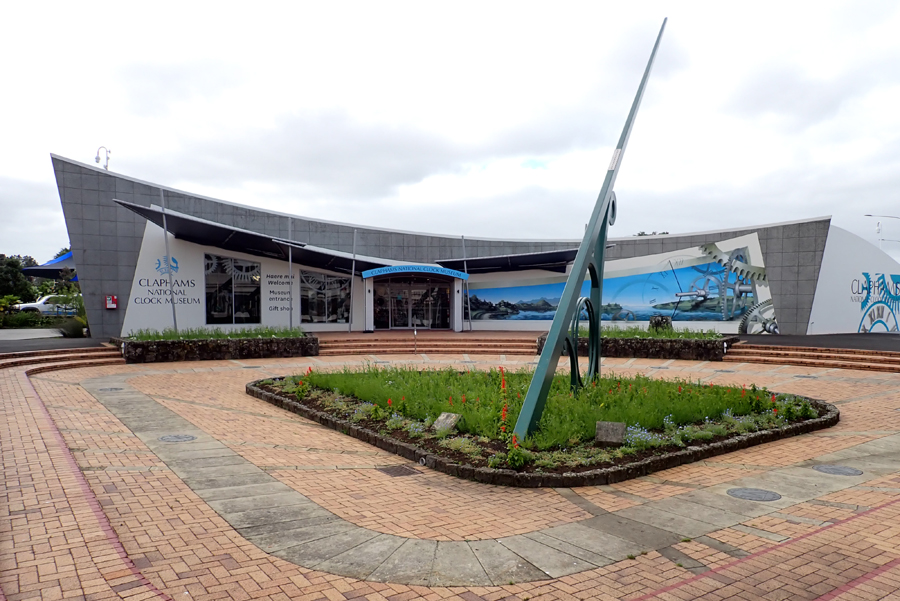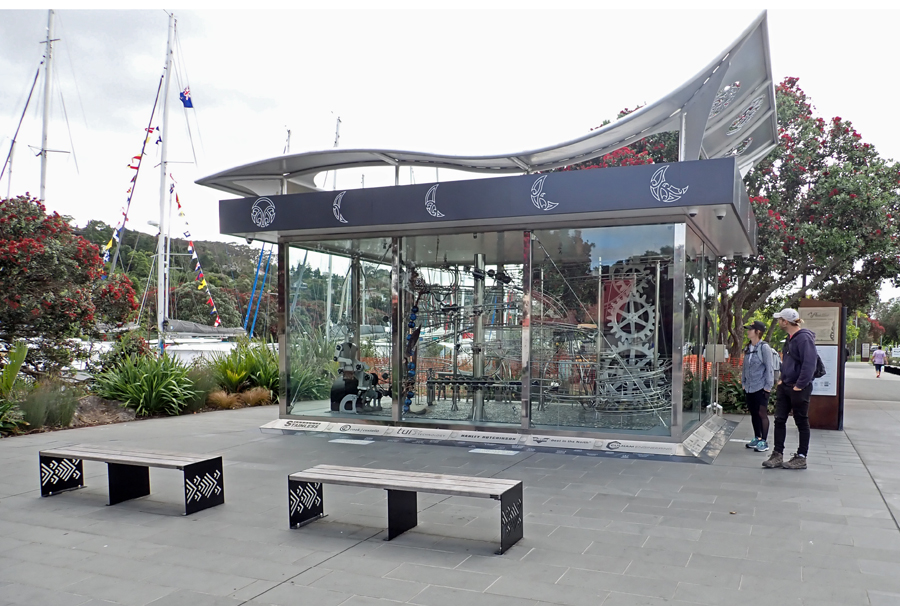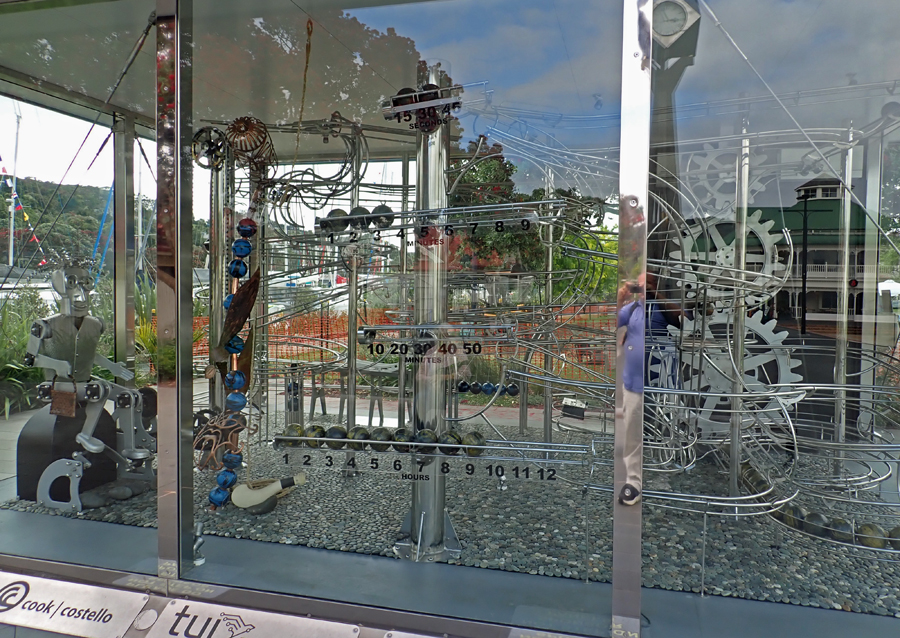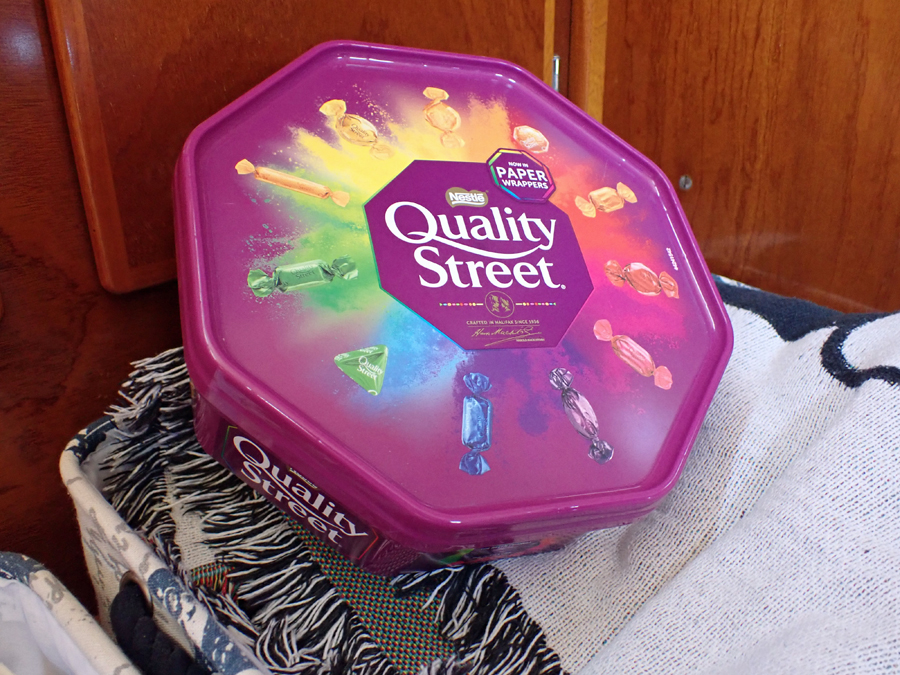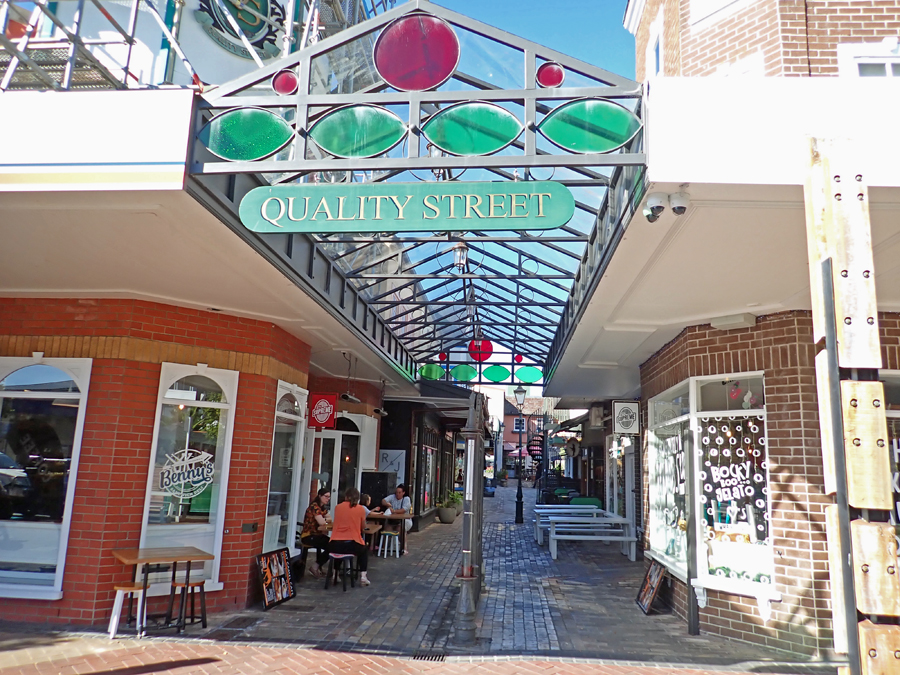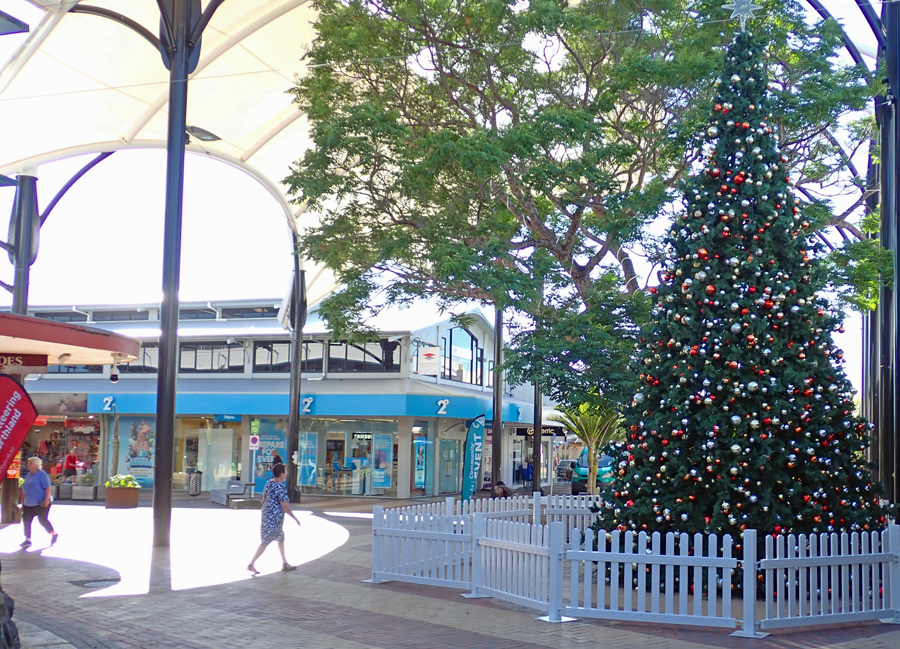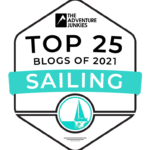It’s nice to be back in a populated first-world country. We can tell we are because of the eggs. I’ll explain my theory. In small nations or unpopulated areas of the world whenever we need eggs, we go to the store and stand in front of the shelf of eggs. In these smaller islands or less wealthy countries, we have a choice of 6 eggs, 12 eggs, or 36 eggs in a tray. That’s it. In some places, we needed to take our own cartons to refill (or buy a box for them in the store). No sizes, no brown or white separation, and certainly no free range (there are usually plenty of free-range chickens in such places in the streets). Eggs are just eggs. You buy a few and are happy about the fact they even had some.
In New Zealand, the grocery stores offer all sorts of eggs. They are sold by size (weight). We had to Google the egg size standards to figure out which size corresponded with small, medium, large, and jumbo. You think I’m kidding here, don’t you? Here is the guide.
We purchased size 7 eggs. For the life of me, I can’t figure out why or how they came up with the numbers: Medium (6) 53g, Large (7) 62g, Jumbo (8), 68g. Why not sizes 1, 2, and 3? Or, why not perhaps a number closely corresponding to the weight, 5, 6 and 7? Why not a letter like, M, L and J? Oh well, perhaps a Kiwi can explain it to me whilst we’re here.
New Zealand doesn’t refrigerate eggs. They sell them unwashed meaning they are shelf-stable for a couple of months. It is not unusual to find an egg with a feather or poop on it. I know people in the USA who’d absolutely freak out over this. Very few places we’ve been in the world wash eggs like the USA does, the ultimate first-world country according to my egg theory.
Our personal preference is unwashed eggs since the refrigerator space on the Puffster is limited. Once they are washed they need to be refrigerated since the wash removes the bloom. Bloom is a natural protective layered coating sealing the shell pores, preventing bacteria from getting inside the shell, and reducing moisture loss from the egg. It is nature’s design to make the egg last longer. Washing the eggs removes this protective layer and reduces the time the egg will remain fresh thus requiring refrigeration.
In addition, they have different brands of eggs. And, even the free-range eggs are sorted and sold by size. Price points are all over the place. I have to laugh since we once purchased eggs from a truck parked on a side street by the market in Grenada. They tasted like eggs. Imagine that!
Our first impression of New Zealand is that the country is very tightly government-regulated. I’ll explain how we quickly jumped to this conclusion.
Boats in marinas plug into shore power. This is a dockside power outlet we can use to bypass our onboard means of power supply. RV’s will do the same when in a camp/park. This allows us to run things like heat, air-conditioning, the washing machine, toaster oven etc. without having to run our generator. We also run battery chargers from shore power to keep our 12v dc and 24v dc systems running without the need to cycle the boat’s batteries.
In New Zealand, we are required to have our shore power cord tested. This must be done pretty much upon arrival. And, the requirement is stipulated by some sort of government law. This is the very first country we’ve visited that has a regulation like this. It’s not a big deal but, I have to wonder why this is required. It’s not like boats all around the world are bursting into flames because they have faulty shore power cords.
The process required me to take our cord to an electrical shop just a short walk from the marina. They only test the cords between 7:30 am and 8:00 am. After that, the electricians are out on job sites and the cord must be left there for the following morning. I showed up at 7:30 am and banged on the front door as instructed (they were not open yet). I met a really great young guy who had all sorts of questions about where we’ve sailed so far. When I meet someone like this I wonder if extensive traveling is somewhere in their future. He certainly had the bug and the curiosity. I asked him what they tested the cord for and what type of faults showed up.
He explained they first look for holes in the sheave. After this, they check the interior insulation of the cord to make sure it is compliant. This involves sending a zap of 500 volts down the cord on one wire while testing the other wires for leaking current. Then, they visually check the plugs. It would be better if they looked inside the plug for corrosion but this is not done. After all of this, a sticker is applied to the male end of the cord and it is allowed to be plugged into the shore power outlet. This all cost NZ$20. He said, he’d never had a cord fail an inspection.
The marina told me that for boaters in New Zealand, the regulation goes far beyond the power cord and the owners must have their vessel’s wiring inspected every four years by a certified electrician. Again, I do not see boats in the rest of the world bursting into flames or killing people as a result of bad wiring. Yes, it does happen on neglected boats but to have a government regulatory body seems a little bit overboard (pun intended). Do people’s houses in New Zealand need to have wiring inspections as the house ages? They say it is required for boats because of the corrosive environment. What about beach homes? Just saying.
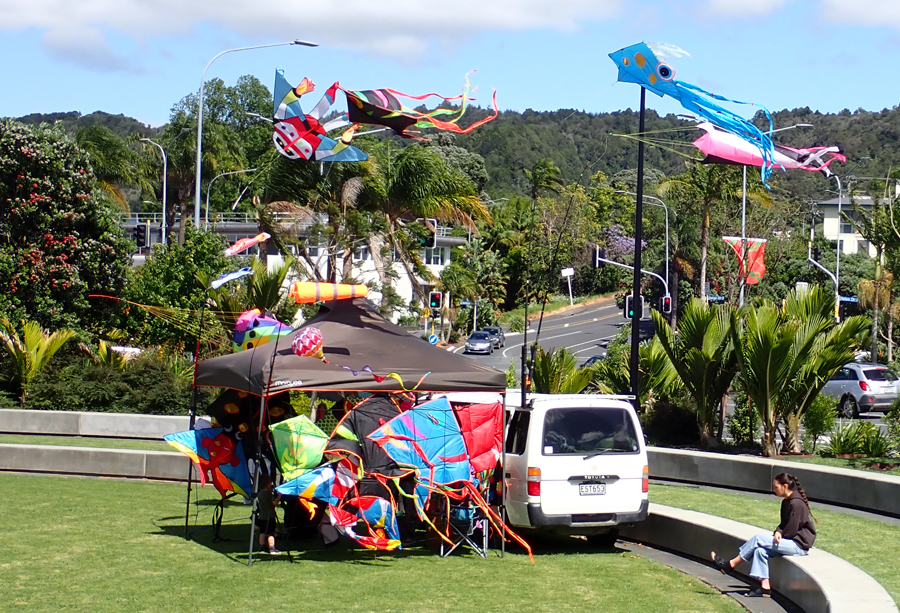
This person had some very cool kites. I like kites and have done since I was a small kid. My Grandma helped me make my first one. It didn’t fly very well.
I recently read, about a person wanting to anchor their boat on the west side of Great Barrier Island. They were told boats have been banned from visiting/anchoring on this side of the island due to invasive seaweed. The government boat ban is to prevent the spread of seaweed. I have to ask here wouldn’t just asking boats to remove any seaweed from their anchor before departing the area accomplish the same thing? Is a total anchoring ban really necessary?
If you are caught anchoring in the prohibited zone amongst the seaweed, you can face a big fine and even go to jail. I can almost see this scenario happening. One guy approaches another guy in a prison yard and says, what are you in for? The second guy says I murdered my wife, how ‘bout you? The first guy answers, I was caught with seaweed.
Propane tank refills are something we are now trying to figure out. We recently met an Australian couple that have been here for a couple of years and have yet to figure out how to refill tanks. They think it might not be possible. There seems to be some sort of preapproval needed to refill a tank. In every other country we’ve visited, we drop off the tank and it is filled without issues (unless the tank is obviously unsafe or very old). The New Zealand requirements are not easy to find on the internet. I said to Cindy it might just be easier to buy new tanks from the local boat store. She agreed until we read that even new tanks must be inspected before the first fill. Shaking my head, seriously!
And, then there are the worms. I could go on and on here about the worm regulations on boats. But, I’ll spare you the misery. Short version: some worms live in the sea. A few of these worms found their way to New Zealand. The government is trying to control the spread of the worms by forcing boaters to have the hulls cleaned (at great expense) when moving from one bay to another. I have to wonder if anyone ever educated the New Zealand government about tidal flows and ocean currents. I wonder if the worms hitched rides on whales or turtles? This would create a real dilemma for the government, wouldn’t it? Do they kill the whales and turtles or learn to live with the worms?
I am reminded here about a time when Cindy and I visited the Grand Canyon in Arizona, USA. There were a lot of protests going on about how a dam was controlling the flow of water through the canyon. A group of people strongly felt the canyon should be left natural allowing nature to control the flow of the river at the bottom of the canyon.
I asked a Park Ranger his thoughts on the subject. He gave a rather insightful answer. He basically said the canyon was there long before human existence. And, it’ll be there long after human existence. So, in the overall scheme of things, what does it really matter? I feel the same way about the worms. Is the government ever going to stop them? But, in the meantime, let’s throw a few people in jail for disobeying the regulation. They can be cellmates with the seaweed people.
These are the government regulations we have encountered in our first couple of weeks here. I wonder what else is to come.
Whenever we land in a new place, the first thing we do (after checking in with the authorities) is buy a SIM card. This is how we can tell what taxes are going to be like. In Fiji, we paid about US$30 for two phones with more data than we could ever use. In French Polynesia, the opposite was true. We had only one phone and the cost was about US$130 per month for 130 GB of data. The only difference between these two products is government fees and taxes. In New Zealand, the price falls in the middle. It’s certainly not as cheap as Fiji but much less than French Polynesia. Our two phones with data will cost us about US$85 per month.
Being in a first world country, which according to my egg theory we are, there are choices of carriers. We asked at the marina office which is the best carrier. They basically said none are better or worse than the others. We opted for a company called 2 Degrees. Our choice was based on the fact we found them first in town and the clerk who helped us had bright yellow hair. How could you not buy data SIM cards from a person with bright yellow hair? So, now we are connected.
What is the first thing we look for? Answer: boat parts. We always seem to land with a list of things for which we need to shop. Luckily, we didn’t have anything important break during our journey here. However, while we sit for 12 days and stare at things on the boat during an ocean passage, we notice things getting worn. We make a list. We also had a list of things we wanted to buy that had not been available to us in the past countries visited. This is a silly example, but I wanted a good-quality frying pan.
The non-stick surface on the one we had was coming off. French Polynesia obviously sold cookware, but it was stupid expensive, and badly made. We replaced the pan in Tahiti with one purchased at Carrefour (I really miss Williams Sonoma). It lasted until Fiji. In Fiji, I purchased another cheap pan to tie us over to New Zealand. Here in New Zealand we found a really solid pan made by Brabantia, a Dutch company, and saved 70% on a Black Friday deal.
Multiply the above scenario by about 50 items and you will have an idea of what it is like to travel the world by boat. You purchase what you can where you can. There is always a list when we get to a first-world country. Why not buy stuff online as we go? Well, this means we need to have an address. This is fine if we are staying in a marina. Also, there is a question of import fees and government red tape. It’s not as easy as it sounds. Amazon has just now started shipping to French Polynesia. eBay still doesn’t. In Fiji, it took about 4 weeks to get an item from the EU or USA. And, international shipping is expensive. Often, the price of shipping is more than the item in the box.
Knowing all of this now, I think you’ll understand when I make this next statement. Our first couple of weeks in New Zealand were spent in industrial areas, shopping online, browsing local chandries, lining up contractors, and having the occasional meal out. Eventually, we hope to actually get out and explore.
We managed to find our 2023 Christmas tree ornament. Since we were married, we’ve decorated our trees with small knick-knacks from our travels or a small keepsake from something important to us. Decorating our tree always meant a trip down memory lane. We’ve kept this tradition going while traveling by boat. We have ornaments from all the places we’ve visited. This year’s ornament is a Kiwi in a Santa hat.
From our home to your home, wherever this may find you, we wish you a happy Christmas and good health, peace, love, and joy in the New Year.
